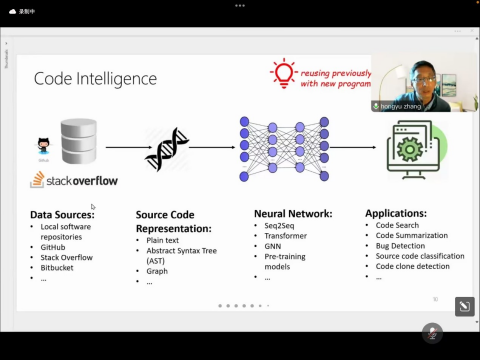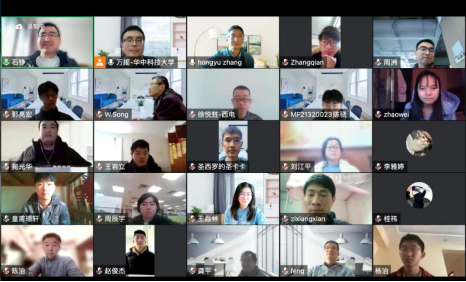On the morning of January 6, Professor Hongyu Zhang from the University of Newcastle, Australia was invited to give an online lecture on "Code Intelligence: Challenges and Progress". Professor Zhang elaborated the research progress and challenges in the field of code intelligence to more than 120 teachers and students of the School of Computer ScienceandTechnology, HUST. More than 1500 people watched thelectureonline.
Professor Hongyu Zhang first illustratedthe definition and research background of code intelligence, and introduced the research achievements of his research team in the field of code intelligence since 2016 by citing GitHub Copilot and AlphaCode.He mainly introducedthe operation principle and application of code search, which uses deep learning technology to retrieve code fragments according to natural language query, so as to improve the efficiency of software development.

Later, focusing on the challenge of "source code representation" in code intelligence, Zhang introduced many challenges in code representation based on code Abstract Syntax Tree (AST), and introduced two methods of code representation learning through AST segmentation. He also pointedout that although current research has learned from different code modes (including AST, CFG, and DFG), it is still unknown which code mode is more effective.
Then, Zhang took the chatGPT released by OpenAI as the starting point, gave several concrete case analysis, showing the amazing effect of chatGPT based on pre-training language model in code representation learning and code generation, and put forward many open questions worth exploring. Based on this, he pointed out the "high resource consumption" in the current largecode mode based on pre-training language model, and put forward three different optimization methods, namely compression model, model-based modularization and input compression.
At the end of the lecture, Zhang discussed more challenges in the field of code intelligence, including the quality of the code intelligence model, interpretability, application in low resource scenarios, and code intellectual property. At the same time, he encouraged students who are interested in itto focus on the above challenges to carry out in-depth study and research, and strive to solve the key technical challenges in the field of code intelligence.

In the section of exchanging ideas, the teachers and students engaged in a heated online discussion with Professor Zhang on topics such as the large-scale model training method of code intelligence and the prospect of technology development. Zhang showed his full confidence in the development of the field of code intelligence and encouraged the teachers and students attending the conference to carry out research and further study in this field.
Hongyu Zhang is currently an associate professor at the University of Newcastle, Australia. Previously, he was a Lead Researcher at Microsoft Research Asia and an Associate Professor at Tsinghua University, China. What’s more, he is recognized as one of the 20 most productive software engineering researchers in the world (2010-2020) and has published more than 180 research papers ininternational journals and conferences. In addition, he has received more than 8 ACM Awards for Outstanding Paper and Best Paper. Zhang is mainly engaged in the research of intelligent software engineering, software analytics, maintenance, and reuse. The main theme of his research is to improve software quality and productivity by mining software data. Zhang is the pioneer in the field of code intelligence.
